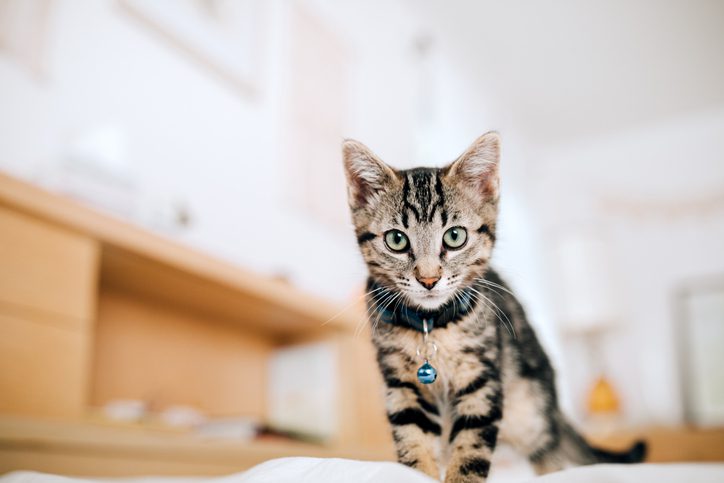Cats can be extremely picky about what they eat. Whether it is from pain, illness or just plain stubbornness, they may turn their noses up for reasons you can’t even come up with. Unlike a lot of animals, missing meals may lead to real trouble for your feline friend. So as a cat owner, what can you do to get your kitty interested in food again? Read on to learn more.

Common Causes of Why Your Cat Isn’t Eating
The first step is to figure out why your cat is not eating, and your veterinarian in North Charleston, SC should be able to help you decipher the clues.
The causes include:
- Inflamed Pancreas
- Dental Pain, such as a broken tooth or gum infection
- Digestive Obstruction
- Urinary Blockage
- Kidney Disease
- Stress
- Upper Respiratory Infection
- Constipation
Tips to Get Your Cat Interested in Food Again
As you can tell from the list above, the vast majority of these causes can lead to serious health complications for your cat. If it has been a while since your cat has eaten, the first thing your vet will tell you is to do what it takes to get her back interested in food.
Listed below are tips you can follow to help with this:
Switch to an Odorous Food
Wet or canned cat foods tend to be pretty smelly – particularly seafood ones – and scent is important to taste. In the wild, cats rely on their sense of smell to find food, so an odorous can of food may be what it takes to entice your cat to eat again.
Heat Up the Food
Either adding hot water to the food or microwaving it for a short time will perhaps encourage your cat to begin eating. Make sure to test the temperature of the food before giving it to your cat, especially if you have used the microwave to warm it. When using the microwave, set the timer to only about 5 second increments.
Sample Soups (broths)
Chicken or beef broth might stimulate your cat’s appetite enough to get her interested in her own food again. You can either give her a small bowl of it or even put it in her wet or dry food. Make sure to get the broths low in sodium. Bone broth is a good choice as well, and it’s packed with amino acids and other important nutrients that may improve your cat’s health.
Add Cheese to the Food
The smellier the cheese, the more likely it is to catch your cat’s interest. Grated parmesan is a good option to sprinkle onto your cat’s food. Be sure not to give him too much, though, because dairy can upset his stomach and add to the lack of interest in eating.
Try Canned Tuna
Canned tuna can’t be the only thing your cat eats for a long period of time, as it does not have all the nutrients that they need to stay healthy. But sometimes just getting your cat interested in eating is all you will need to get over that hurdle. Start off by just pouring the tuna juice into a small dish or over your cat’s food. If your cat seems to really enjoy it, you can offer them some of the actual meat or mix it into the food.
Sprinkle Yeast Powder on the Food
Nutritional Yeast Power has a cheesy flavor that should bring your cat to his food bowl and encourage him to start eating again. It also contains plenty of B vitamins, which may help him feel better faster!
Add in Appetite Enhancers
There’s a wide assortment of appetite stimulants you can find at your local pet food store or online. There is also a prescription drug your vet may suggest called Mirtazapine that comes in the form of a pill. Effects of this drug are usually seen within one or two days and works by enhancing the activity of neurotransmitters and serotonin in the brain.
Try Feeding Your Cat Baby Food
Baby foods that come in jars or pouches can be particularly pungent in order. You can find lots of different meat options for baby foods, like turkey or beef, and they’re creamy enough you could mix it with your cat’s food or give it to her on its own. Like with tuna, this can’t be your cat’s only source of food for long, as it is missing the nutrients that she will need to stay healthy.
Add in Powerful Probiotic Powders
Probiotics don’t just contain good bacteria that will improve your cat’s gut and overall health; the powder also has a tangy, fragrant odor that might persuade your cat to take a taste and stimulate his appetite. Probiotic powders that are safe for pets can be found at your local pet food store or website.
Contact Northwoods Veterinary Clinic if Your Cat Isn’t Eating
No matter the reason behind your cat’s reluctance to eat or lack of appetite, you should notify your veterinarian. Any change in eating or drinking can be a sign of a more serious problem and must be addressed as soon as possible. The less time your cat goes without eating, the less potential damage will be done.
For more information on your cat not eating, or if you would like to schedule an appointment, contact Northwoods Veterinary Clinic in North Charleston, SC. Our veterinarians are dedicated to providing life-long care for your pet. We will find the reason that your cat isn’t eating and come up with a plan to change that. Call us today at (843) 553-0441.
